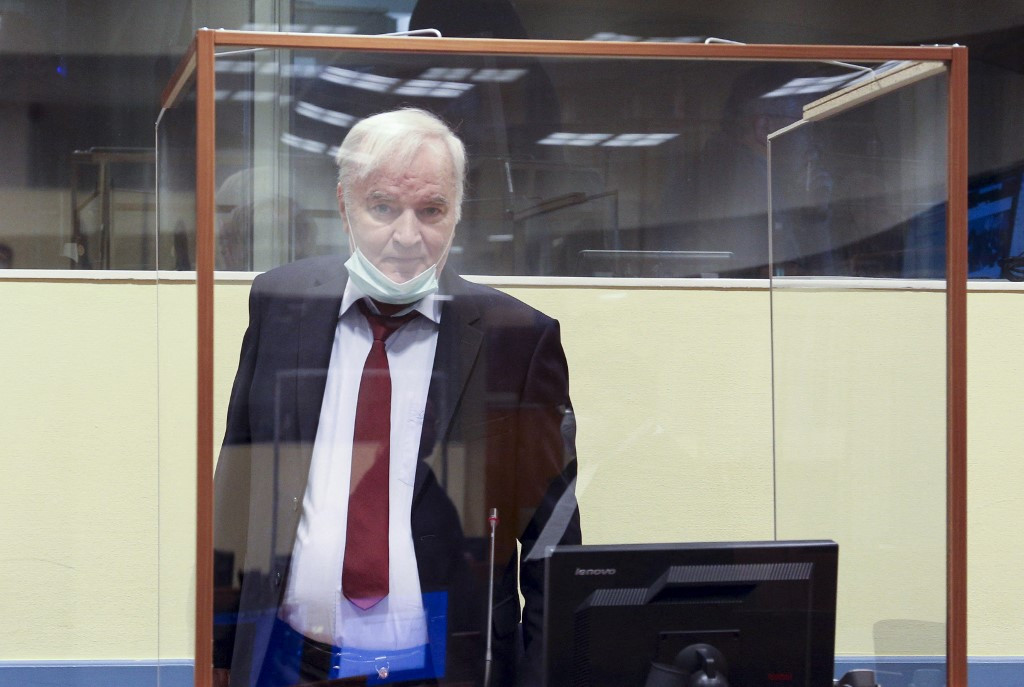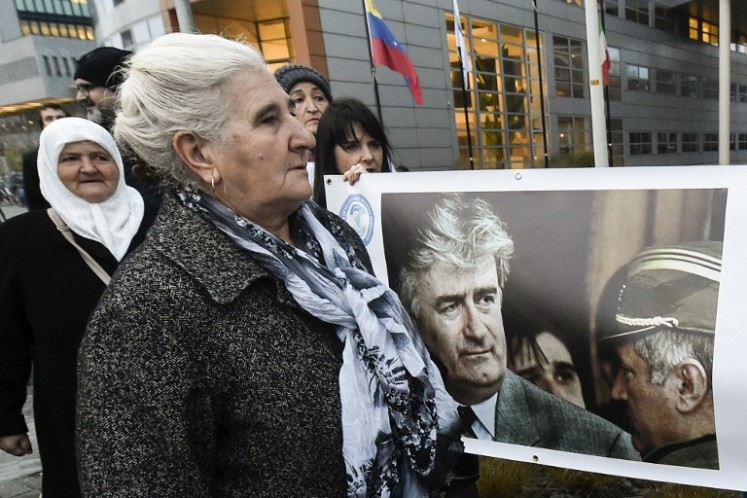Ratko Mladic: Serb crusader dubbed 'epitome of evil'
Change Size
 This handout picture released by UN- IRMCT (International Residual Mechanism for Criminal Tribunals) shows Bosnian Serb ex-general Ratko Mladic (C), who has been sentenced to life imprisonment, arrives before the international UN tribunal in The Hague where he is appealing his conviction, on August 25, 2020. International judges will give their verdict on June 8, 2021 on an appeal by former Bosnian Serb military chief Ratko Mladic against his genocide conviction over the 1995 Srebrenica massacre, a UN court said on June 4, 2021.
Mladic was sentenced to life in prison in 2017 for overseeing the massacre of some 8,000 Muslim men and boys, and for war crimes and crimes against humanity in general during the 1992-95 Bosnian war. (AFP/UN-IRMCT/Leslie Hondebrink-Hermer/UN-IRMCT )
This handout picture released by UN- IRMCT (International Residual Mechanism for Criminal Tribunals) shows Bosnian Serb ex-general Ratko Mladic (C), who has been sentenced to life imprisonment, arrives before the international UN tribunal in The Hague where he is appealing his conviction, on August 25, 2020. International judges will give their verdict on June 8, 2021 on an appeal by former Bosnian Serb military chief Ratko Mladic against his genocide conviction over the 1995 Srebrenica massacre, a UN court said on June 4, 2021.
Mladic was sentenced to life in prison in 2017 for overseeing the massacre of some 8,000 Muslim men and boys, and for war crimes and crimes against humanity in general during the 1992-95 Bosnian war. (AFP/UN-IRMCT/Leslie Hondebrink-Hermer/UN-IRMCT )
R
atko Mladic insists he was chosen by "fate" to defend the Serb people from a Western onslaught, but on Tuesday he will find out if his fate is to spend the rest of his life in jail for genocide.
Judges will rule on his appeal against his 2017 conviction for war crimes in Bosnia that judges in The Hague said were "amongst the most heinous known to humankind".
Among the most notorious was the massacre of some 8,000 Muslim boys and men in Srebrenica in 1995 -- a genocide, the court decided, orchestrated by military leader Mladic and his political comrade Radovan Karadzic.
The slaughter -- the worst single atrocity in Europe since World War II -- led media across the world to dub him "the butcher of Bosnia".
Former UN rights chief Zeid Ra'ad al Hussein described him as "the epitome of evil" after his conviction.
But most Serbs continue to revere him.
"He only defended his people," Serb veteran Ljubo Tomovic told AFP. "To convict him would be a disgrace and a sin."
Mladic, who is in his late 70s, has repeatedly pushed the image of himself as "a simple man" chosen to protect his people.
"Fate put me in a position to defend my country that you Western powers had devastated with the help of the Vatican and the Western mafia," he told his appeal hearing last year.
Yet he oversaw a siege of the Bosnian capital, Sarajevo, for more than three years, his snipers and artillery shells killing thousands of men, women and children in the streets and in their homes.
And video footage from Srebrenica shows him reassuring a 12-year-old Muslim boy shortly before his soldiers massacre thousands of civilians.

Days later, he is seen returning to a deserted Srebrenica, telling the camera: "We give this town to the Serb people as a gift."
Mladic formed a Serb nationalist triumvirate with Karadzic and ex-Yugoslav president Slobodan Milosevic that unleashed a wave of ethnic killing in a bid to redraw the map of the region.
While Karadzic was the ideologue and Milosevic the wily politician, Mladic was the soldier and his metier was waging war.
Mladic had barely drawn breath before his life was indelibly marked by conflict.
He was born during World War II in Kalinovik in eastern Bosnia -- most accounts say in 1942, but Mladic told the tribunal he was actually born in 1943.
His father was killed at the bitter end of the war, fighting for Marshal Tito, the leader who managed to knit together the multi-ethnic state of Yugoslavia and suppress simmering enmities.
By most accounts, Mladic always wanted to be a soldier.
He left for army training in Belgrade in the early 1960s, becoming an officer by the age of 22 and ascending to be commander of the Bosnian Serb forces in the war.
Although he was revered by his men, former Yugoslav army spokesman Ljubodrag Stojadinovic once described him as "narcissistic, conceited, vain and arrogant".
During the war, he baffled international negotiators with rambling diatribes on Serbian history.
In the closing days of the war, close allies questioned his mental faculties.
"I respected General Mladic as a soldier and a man," the late former Montenegrin president Momir Bulatovic told a 1990s BBC documentary.
"But after three years of war, he'd lost contact with reality."
Mladic was dismissed from his post after being indicted in 1995, but he evaded capture for another 16 years.
At first, he led a life of luxury, pampered by the Serbian military, but the pressure on him mounted after Milosevic fell from power in 1999.
He was finally arrested in May 2011 at his cousin's country house in northern Serbia, his mind immediately turning to an incident from during the war.
Not to the thousands of Muslims whose deaths he orchestrated, but rather to his daughter, Ana, who killed herself in 1994 at the age of 23.
Some accounts say she could not bear the shame of the crimes committed by her father, though Mladic's family dispute this.
His last request before being transferred to the court was to visit her grave.
During all this time, a legend had grown around him, his wartime leadership immortalized in murals around Republika Srpska -- the Serbian entity within Bosnia.
Republika Srpska leader Milorad Dodik is among many who hail him as a hero, telling reporters last month: "There was no genocide in Srebrenica. There is no credible evidence or any other evidence that it was genocide."
Many disagree.
"Denial of genocide is the last phase of the genocide," said Serge Brammertz, prosecutor at The Hague.









